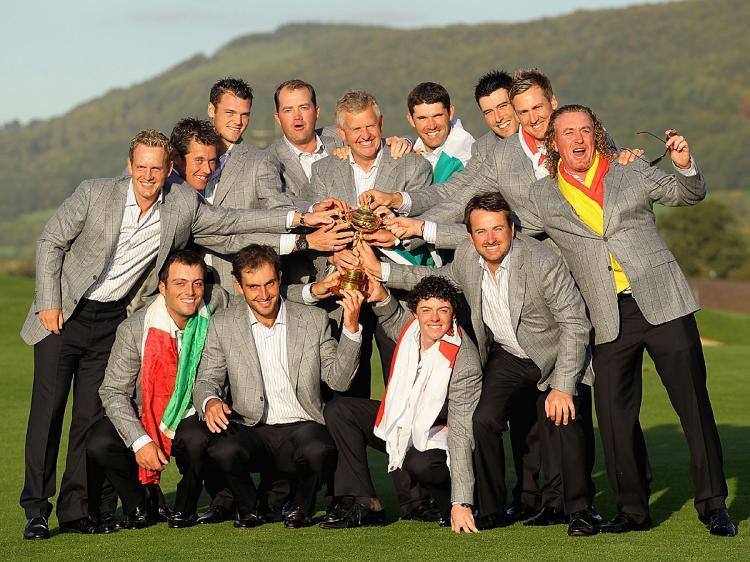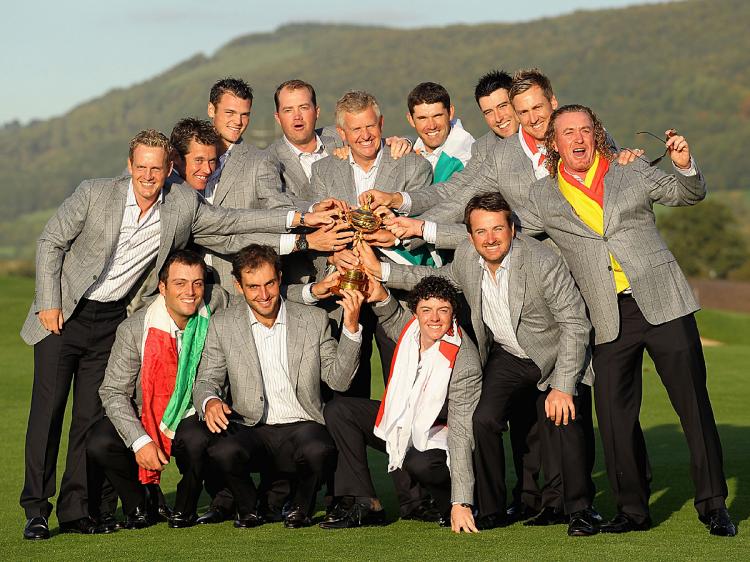For the past three days two things have drawn my attention: the formation of a new Dutch government, and the world’s most prestigious golf tournament, the Ryder Cup, played in Wales. Whereas the first irritated me in every possible sort of way, the second brought entertainment and a solution to the first. From now on I will proudly consider myself a European.
It took Dutch politicians about four months to form a new government after the elections in June. The Liberal VVD Party and the Christian Democrats CDA finally managed to form a so-called minority coalition that relies on parliamentary support of Geert Wilders’ anti-Islam Party (PVV). This unusual construction was necessary because the parties that form the coalition government need to have a majority of votes in parliament.
This situation has put Geert Wilders, the most controversial politician in the Netherlands, in a very special position: he could pitch in some of his rather extremist ideas into the coalition agreement in exchange for his support. Furthermore, he will be exempt from bearing the true responsibility, which governing entails because he won’t technically be part of the coalition government. He will have the freedom to insult people as usual and if the government performs well, the credits will be his, if disaster occurs, which I expect, then Wilders’s hands are clean.
After the presentation of the new coalition agreement, Wilders triumphantly estimated that there will be 50 percent fewer non-Western immigrants as a result of the tightened immigration policy, a huge step forward in his view. According to Wilders there will be “unprecedented” measures to curb the migration flow of asylum seekers and those seeking to join their families. It sounds sinister.
An inhuman immigration policy was the small concession given to Wilders in order to form a government coalition. To me this says that people don’t care that much, or maybe they don’t realize what it really means; but I do. Practically, it means for me that it will become twice as hard to reunite with my Chinese wife. Never mind that I am fully able to support my wife, have never asked for a penny from the state, and never broken the law. Wasn’t it enough that the Dutch immigration policy is already among the strictest in the world? Immigration procedure already includes a long-term compulsory “integration course,” which is somewhat like a brainwashing course.
Ironically, Wilders’s name has put new life into the Dutch verb “verwilderen,” which sounds like Wilders’s name, the verb itself means “bestialize,” “de-humanize,” “to go wild,“ and “degeneration.” This verb is now used to describe Wilders’s influence on Dutch society.
“The answer is not to shut down, for Holland particularly this would be such a betrayal of everything that Holland is about. For 500 years you have been one of the most open countries in the world to ideas, to goods, and to people. Now when the rest of the world is opening up, you want to close down?” Fareed Zakaria, the editor and CCN host, told Dutch journalist, Max Westerman.
Mr. Zakaria described immigration as a strength or secret weapon, rather than a weakness. He said the Netherlands was something like the birthplace of enlightened ideals such as freedom, tolerance, and being open-minded about foreign cultures, that the United States has adopted many of these ideals but that we (the Netherlands) now are in danger of forgetting them.
When I was watching the Ryder Cup over the weekend I was delighted to see golfers from Spain, England, Germany, Italy, and so on perform as one European team. At the same time I started to think of all these wonderful countries as states of Europe, and for the first time I felt proud of being European.
It took Dutch politicians about four months to form a new government after the elections in June. The Liberal VVD Party and the Christian Democrats CDA finally managed to form a so-called minority coalition that relies on parliamentary support of Geert Wilders’ anti-Islam Party (PVV). This unusual construction was necessary because the parties that form the coalition government need to have a majority of votes in parliament.
This situation has put Geert Wilders, the most controversial politician in the Netherlands, in a very special position: he could pitch in some of his rather extremist ideas into the coalition agreement in exchange for his support. Furthermore, he will be exempt from bearing the true responsibility, which governing entails because he won’t technically be part of the coalition government. He will have the freedom to insult people as usual and if the government performs well, the credits will be his, if disaster occurs, which I expect, then Wilders’s hands are clean.
After the presentation of the new coalition agreement, Wilders triumphantly estimated that there will be 50 percent fewer non-Western immigrants as a result of the tightened immigration policy, a huge step forward in his view. According to Wilders there will be “unprecedented” measures to curb the migration flow of asylum seekers and those seeking to join their families. It sounds sinister.
An inhuman immigration policy was the small concession given to Wilders in order to form a government coalition. To me this says that people don’t care that much, or maybe they don’t realize what it really means; but I do. Practically, it means for me that it will become twice as hard to reunite with my Chinese wife. Never mind that I am fully able to support my wife, have never asked for a penny from the state, and never broken the law. Wasn’t it enough that the Dutch immigration policy is already among the strictest in the world? Immigration procedure already includes a long-term compulsory “integration course,” which is somewhat like a brainwashing course.
Ironically, Wilders’s name has put new life into the Dutch verb “verwilderen,” which sounds like Wilders’s name, the verb itself means “bestialize,” “de-humanize,” “to go wild,“ and “degeneration.” This verb is now used to describe Wilders’s influence on Dutch society.
“The answer is not to shut down, for Holland particularly this would be such a betrayal of everything that Holland is about. For 500 years you have been one of the most open countries in the world to ideas, to goods, and to people. Now when the rest of the world is opening up, you want to close down?” Fareed Zakaria, the editor and CCN host, told Dutch journalist, Max Westerman.
Mr. Zakaria described immigration as a strength or secret weapon, rather than a weakness. He said the Netherlands was something like the birthplace of enlightened ideals such as freedom, tolerance, and being open-minded about foreign cultures, that the United States has adopted many of these ideals but that we (the Netherlands) now are in danger of forgetting them.
When I was watching the Ryder Cup over the weekend I was delighted to see golfers from Spain, England, Germany, Italy, and so on perform as one European team. At the same time I started to think of all these wonderful countries as states of Europe, and for the first time I felt proud of being European.




